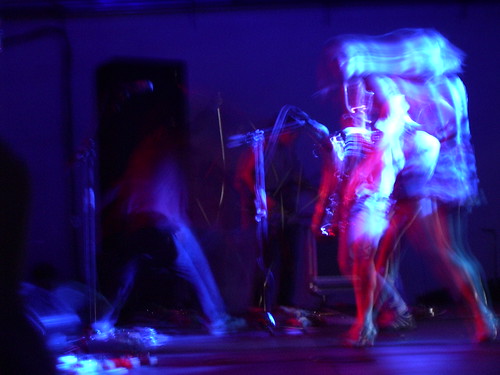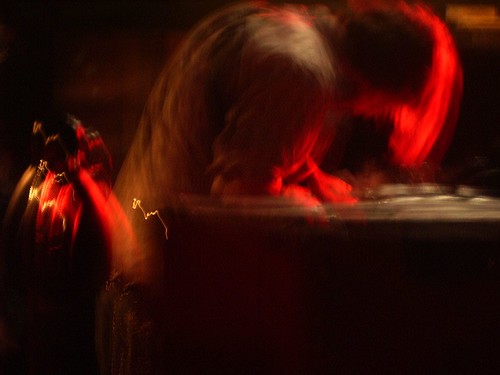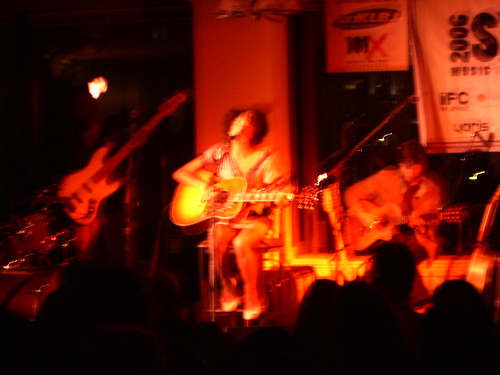The best single you’ll hear all year isn’t actually being released as a single, despite being the comeback from an artist whose absence has been so keenly felt, so breathlessly chronicled. Indeed, to hear it at all you’ll have to undergo the indignity of catching Surf’s Up – the cruddy end of a long line of obnoxious, celeb-voiced animated kiddy movies – at the cinema, or chancing your shekels on its otherwise-unappetising soundtrack album, offering as it does such other grody confections as Sugar Ray, 311 and Incubus.
What I’m saying is, if you haven’t heard Lauryn Hill’s ‘Lose Myself’ yet, don’t blame yourself; this absolute gem of a song, pregnant with quirk and joy and soul, seems to be charting a course evasive of all radars, and it’s a terrible shame. Not least as it sounds like a desperate final healing gesture from an artist whose solo debut – 1998’s The Miseducation Of Lauryn Hill – promised such future riches, but in truth foreshadowed the brutal running aground of its creator.
What made Miseducation such a pleasure was the sheer joy of the album, the performances possessed of a most deliciously unforced perfection, an album nodding towards both the burgeoning neo-soul movement, and the Hip-Hop from whence Hill’s group The Fugees had sprung. The production was etched with the lush drama of 70s soul, the rich tympani rolls scoring the epic ache of ‘Ex-Factor’, the itchy clav-funk of ‘Every Ghetto, Every City’, the satin-clad afterglow calm of ‘Nothing Even Matters’, building a canvas referencing the politicised, auteurist soul of artists like Curtis Mayfield and, most abundantly, Stevie Wonder. Still, Hip-Hop’s respect for The Word, lots of them, imbued with undoubted deep personal meaning and squeezed into verses that could barely hold them, was key.
Given the rapturous reception the album enjoyed, Lauryn Hill should have been poised for glorious success; Miseducation having staked a claim for Hill as a true creative force within The Fugees – something often obscured by the considerable success of bandmate Wyclef Jean’s solo and producing careers – its follow up would surely galvanise everything the debut had achieved.
Almost a decade later, that follow up still hasn’t arrived. In the interim, Hill has visibly struggled; the gossip pages have constructed their own myth, and perhaps there is truth tangled in there, of breakdowns, and of artistic struggles, and of turbulence within her relationship with Rohan Marley, father of her four children. While she continued to collaborate with and produce and write for other artists with great success – Mary J Blige’s sublime ‘All That I Can Say’ is as close to the soul confection of Miseducation as has surfaced since – MTV Unplugged 2.0 was decidedly not the album audiences seduced by ‘Doo Wop (That Thing)’ were expecting, when released in 2002. Gone were all the ersatz soul adornments, any echoes of Hip-Hop; in their place, acoustic guitar and Hill’s voice, rawer than before, older, more characterful. The album wrong-footed many, not least the critics; where Miseducation had been honed, taut, MTV Unplugged 2.0 rambled.
Diverging from the typically-lucrative Unplugged format, Hill’s double set offered more than just tasteful, stripped-bare renderings of her hits; indeed, all of the songs – barring a cover of traditional song ‘The Conquering Lion’ and Bob Marley’s ‘So Much Things I Say’ – she performed were new, unrecorded (and still so, this release aside). These songs were often in an unfinished state, the set peppered with long, meandering, painfully honest conversations between Hill and her audience, where she confessed a lack of confidence, in her self if not her music, and evidenced the struggles she was then enduring. The songs concerned love and religion, war and politics, Hill rocking back and forth, strumming and signifying, tapping into her partner’s bloodline and recalling Bob Marley in her ragged zeal, her raw passion. But where Marley’s songs were anthems, Hill’s were soliloquies, confessionals; she wasn’t offering any more salvation than was contained in any voice honestly airing fears and pain. To these ears, Unplugged 2.0 was a fine album, worth experiencing; five years after the fact, however, and the CD nowhere to hand, I’m struggling to recall any of the melodies. But perhaps the album’s strengths lay elsewhere.
And so on to ‘Lose Myself’, being as it is the next chapter in Hill’s discography. It follows a faltering Fugees reunion, begun at Dave Chappelle’s 2004 Brooklyn Block Party and undone somewhere along the way, with Pras indicating Hill was the stumbling block. It follows rumours of completed sequels to Miseducation, rejected outright by Hill’s label as uncommercial. It follows high-profile meltdowns, like a 2003 performance at The Vatican where Hill spoke out onstage against child abuse within the church.
It is, in many ways, a redemption song, a song about returning to somewhere after a long and fateful journey that has left Lauryn changed, and seeing all anew, as never before. It’s a song of renewal – romantic, spiritual or artistic. Indeed, it’s never clear whether Lauryn is singing to her God, her lover, herself, when she sings “I had to lose myself, to love you better”; the truth is probably an amalgam of the three.
These are words sung after longer than forty days and forty nights in the wilderness, words heavy with a jittery confidence, the narcotic first buzz of healing after a long time spent just ailing. Lauryn’s left the acoustic in the cupboard this time around, switching instead to a fizzy, brash 80s sound, a symphony of neon burbles and singing synths and disco pulse; almost comically upbeat, roller-rink music. Lauryn’s voice, singing over this, chews up a blizzard of words like Subterranean Homesick Dylan, so much to say after so long spent silent, catching her breath long enough to return to a delectable see-saw refrain of “All… I… Ev-er…Wan-ted was Love”.
For all the souls bared in modern R’n’B, the heartbreaks raised to operatic cataclysms, the moral quandaries played out on mellifluously melodramatic canvasses, few are as transparently, as openly confessional, as cathartic, as Hill. Mary J plays out her every private heartache in such a public arena, but still albums like No More Drama don’t lay her persona as open as Lauryn does when she picks up the lyric book. The drama played out within ‘Lose Myself’ is a grand, deep and torturous one, for sure, a long dark night of the soul reaching its end (but not quite ended, underscoring the track with a further poignancy), a soul questioning itself and struggling with the answers.
She touches upon every troubled corner of her life, her music (“I used to do it for the love of it a long time ago”), her relationship (“I used to love without fear a long time ago”). Her current disharmony, her distance from this idealised sense of self, is played out as a lover who “Took a true love and tried to make it dirty”, but is in truth Lauryn’s own distance from her muse, as much as from her heart. Indeed, this seems the song’s key message about Lauryn and the troubles she’s been going through – that these battles haven’t been fought on a single front, that they’re all linked with and related to each other, and that’s why it’s been so hard.
In its airing of grievances, its tale of a tough road travelled, and its hopeful belief in redemption, there’s a gospel spirit to ‘Lose Myself’ which bests any blues lurking within, and yet ‘Lose Myself’ is no gospel song. There’s no chorus of voices backing Lauryn; she may have reached the end of her exile, but whatever wisdom she recovered from her journey was won single-handedly. The spectres she’s had to confront are opponents she could only best alone, because they were inside of her; the “paralyzing fear of facing failure” in her art, in her relationship, in her love for God. It’s this fear that’s most palpable, the source perhaps of her other heartaches, all presented as insoluble riddles. “Couldn’t stay but I never meant to desert you,” she sings, torn up by the conflict.
Bound up in these dichotomies is that which makes creativity, spirituality, love so very frightening, and so powerful – that it can leave one so changed, that it is so much of a risk, that none of these are games for cowardly or dishonest hearts. So many untruthful souls out there, ready to trick an honest one for kicks alone, it gets so even good love gets treated with fear and suspicion. “There’s something awkward about the selflessness it takes to give love,” she sings, teetering on the edge of a cliff she feels she needs to fling herself from, to find peace and redemption; a leap of faith, in her God, in her love, and in herself.
The trope of dream or fantasy as means of irony reached its apex in pop with The Temptations’ dulcet, hazy lullaby ‘Just My Imagination’, hyper-realist scenes of romantic bliss ultimately revealed as the simple pipe dreams of a perennially lonesome soul. “When her arms enfold me, I hear a rhapsody,” croons Eddie Kendricks, in blind love. “But in reality, she doesn’t even know me.” It’s tempting to see ‘Lose Myself’ as a song possessing a similar poignancy, that it’s a prophecy made in hope of self-fulfillment, that the song is, rather than a simple song of celebration, more a song willing the deliverance Lauryn sings of to come about. It’s a song of yearning for an end to all the lessons, a song hoping that enough wisdom has been hard-won that she can go on living again, rather than just breathing; that she’s healed, not just healing. Maybe love, spiritual peace, are just different degrees of hope and delusion anyway. The song also seems to suggest that this newfound equanimity is fragile, tentative and, like the love of which Eddie Kendricks so sweetly sang, ultimately chimeric. Certainly there’s a shiver, a vulnerability to the hope ‘Lose Myself’ expresses, a flinch skulking behind the bravery.
The sense of Lauryn reconnecting with her music, with her artistic voice, is as problematic. ‘Lose Myself’ is a wonderful song, but also definitely weird, and not exactly built to take on a popscene so tooled for perfection. It sounds cheap, the beats bursting too loud and almost overshadowing synths that sound like cheap Casio presets. But ‘Lose Myself’ triumphs as much because of this ‘demo’-esque quality, as over it, establishing an intimate tone recalling Neil Young’s ‘Will To Love’, a desolate home-recorded fragment which could never be bettered in its shields-dropped resignation. The simplicity of production – unadorned vocal, synths playing out the melodies and dynamics but little else, the sketchy feel – recall the raw honesty of Unplugged 2.0, sweetened with enough pop sugar as to be supremely palatable.
But there’s something about this song that feels intriguingly broken, naggingly ‘wrong’. Certainly, the sentiment of suffering for salvation leaves an unpleasant taste in the mouth; in places, there’s an uncomfortable echo of The Crystals’ infamous domestic-violence torch-song ‘He Hit Me (And It Felt Like A Kiss)’ in ‘Lose Myself’’s sadomasochistic moral, in the self-abnegation and self-flagellation Lauryn feels she needs to undergo in the name of regeneration. And herein lies the essential poignancy of ‘Lose Myself’: the victim throughout, of a careless lover, an absent God, an abused creativity, she feels resolution will only come with her surrender to these forces, an absolute capitulation, losing her ‘self’ to better serve her man, her God, her muse. And so, rather than the brave, bright statement of survival the song seems on first inspection, it is in fact a symptom of sickness, a brief flash of something darker and cloudier than vulnerability, a window upon a very tortured soul, albeit one seemingly functioning – at least fitfully – on a creative level. The song seems strangely lucid, in its exposure of Lauryn’s tragic self-delusion; she isn’t waving hello to a brighter future, she’s drowning.
Which now leaves me a touch uncomfortable about loving this song quite so much. I’m not revelling in Lauryn’s pain by proxy, am only minutely thrilling on a voyeuristic tip, certainly no more than any listener does in the presence of raw and unmediated soul music, which ‘Lose Myself’ most definitely is. It reminds me of songs from the album I’m most likely to turn to when feeling inconsolably blue, the first volume of the late Dave Godin’s Deep Soul Treasures compilation series. Selecting tracks from the soul hinterlands, slow-dance 45s and torch-song jukebox disks, Godin collated an album of brutally bruised soul, stirring grand, near-operatic drama and tragedy. Songs like Kenny Carter’s ‘Showdown’ (a man has to tell his best friend he loves his girl), Larry Banks’ ‘I’m Not The One’ (a man realises he isn’t good enough for his woman), Jimmy Holliday’s ‘The Turning Point’ (a man acknowledges he will be haunted by lost love for the rest of his life), and Irma Thomas’s ‘Anyone Who Knows What Love Is (Will Understand)’ (a woman justifies her undying love for a man who cheats on and abuses her) painted, with scything strings and wounded but valiant vocal performances, epic stories of eternal paradoxes, problems without solutions, cognitive dissonance that made sense only to the protagonist, insulating them within their tragic loneliness.
‘Lose Myself’ fits within this lineage, even if its deceptively-bright synthesiser bounce stands in stark contrast to the scratchy soul of Godin’s selections. Like these great, grand soul songs, ‘Lose Myself’ is a story told without fear of how it will be received, a heart turned open enough to let its wounds breathe freely; and, like the great soul songs, Lauryn lays that wound open for all to see, to let others draw wisdom from her story, even if the path her protagonist takes seems ultimately a harsh and negative one. Set to a stricken but upbeat melody, sung with a sense of life that belies the pain contained within that voice, these songs hum with a potent dramatic irony, making something positive and alive from the most deathly and dark emotions, and delivering something truthful, with an unforgiving honesty. And like those great songs, ‘Lose Myself’ looks likely to remain an obscure gem, prey for the aficionados excavating this era of soul in the decades to come.




3 comments:
Thank you. I love Lauryn Hill. I love "Unplugged". I admit, I've only heard "Lose Myself" once, and I was not quite as moved as you. But, now I will listen again. Lauryn is one of the greatest, truest artists of our time. Thirty years from now, or upon her death, these non-commercial songs will be revered and treasured.
I really loved your passage, it was very beautifully written. I wasen't aware that critics didn't take to "unplugged", i saw it as a master piece. Lauryn Hill seems to be so true and I feel like she doesn't allow society to taint her believes and that really shows through her music.
Susie Lane
Lauryn Hill
come alive
feel the air
it's living again
Post a Comment